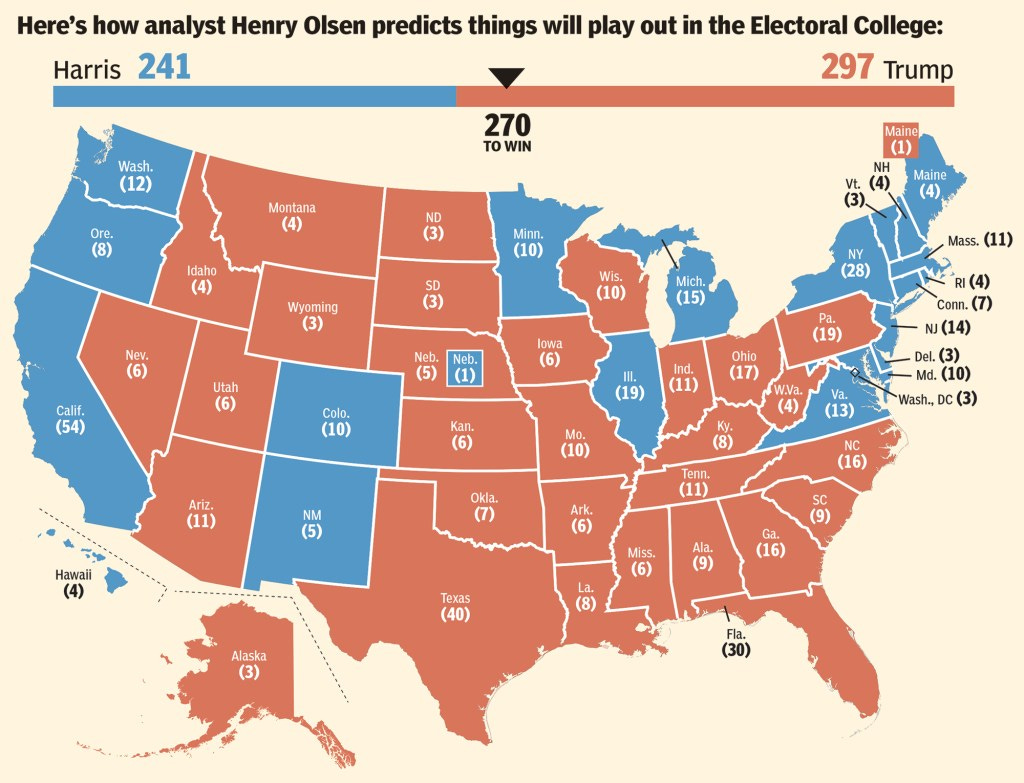A Few Predictions, Observations, and Your 2024 Election Icon
I'm out of the prediction business on presidential elections, but can still predict a few other races. Also, questions and observations about campaigns this cycle. Was P'Nut on your bingo card?
I have zero credibility predicting the outcome of most elections, especially the presidency. I am more often wrong than right, especially over the past decade. I certainly cannot predict how crazy events—like pet squirrels being euthanized—will affect election outcomes.
In 2012, I predicted Mitt Romney would defeat Barack Obama for the presidency.
In 2015, I laughed when Donald Trump famously descended the elevator at Trump Tower and announced his presidential campaign. I laughed when one of my sons told me, “You know he’s going to win.” I predicted Hillary Clinton would win in a landslide. We saw how that turned out. I believed the polling. I wasn’t alone. I listen more closely to my son’s prognostications.
In 2020, I thought Donald Trump would squeak out a narrow reelection. I wasn’t expecting the deluge of Democratic mail ballots, at least to the degree that would make Joe Biden the winner. At least the public polling and I were both wrong.
In 2022, a mid-term election, I predicted the Republicans would return to a majority in the US Senate after an increasingly unpopular Biden-Harris Administration. I didn’t believe the polls, which showed otherwise. The polls were correct this time, as moderate voters didn’t like several poor-caliber Senate and House candidates.
So, I’ve decided not to predict the winner of the presidential election. Instead, I will defer to Henry Olsen, the uber-smart columnist for the Washington Post and the New York Post and former head of the Ethics and Public Policy Center in Washington. His prediction is among the most believable, even if I think he’s too optimistic about how many seats Republicans will win for the US Senate. And I think New Hampshire may surprise us, thanks to a terrific campaign by the Granite State’s GOP nominee for Governor, former US Senator Kelly Ayotte.
I predict that whoever wins the presidency, their party will win control of the House of Representatives. But the Senate is going to the GOP, regardless.
After the “red mirage” of 2022, the House GOP only holds a 5-seat majority. According to the Cook Political Report, there are only 22 toss-up seats in this year’s election, 12 held by Republicans. There are another 21 seats that “lean” one way or the other, 11 of which are held by Democrats. That’s less than ten percent of seats on the House of Representatives that are truly competitive, not what our Founders envisioned.
The only people who love that level of continuity are incumbents and lobbyists.
I won’t delve into the historical record, but we don’t have to go back very far - the last one - to find an election where the winning president’s party lost House seats. Joe Biden won, but Democrats lost 13 US House seats. Four years earlier, Donald Trump won, of course, but House Republicans lost six seats. George H. W. Bush lost two seats in his 1988 election, and Bill Clinton lost Democratic House seats - 19 in total - both years he was elected. John F. Kennedy lost 22 seats in 1960 when he defeated Richard M. Nixon. The following is from the American Presidency Project. The last two columns are House and Senate seat gains or losses, respectively.
Seats in Congress Gained or Lost by the President's Party in Presidential Election Years
Most are easily explained. Kennedy’s election followed a massive Democratic landslide during the recession year of 1958. The close 1960 election was a “course correction.” The same is true of the Biden election, which came on the heels of a Democratic tsunami in 2018.
Had the “red wave” of 2022 occurred, there’s little doubt that Democrats would win seats in 2024 no matter who won the presidency. One silver lining from that election for the GOP is that it should gain a few seats, somewhere between 6 and 12, if Trump wins. If Harris wins, a Democratic majority, however slim, is more likely. It is possible that Harris wins and the House remains nominally Republican. Very nominally.
GOP House gains are likely to start in North Carolina, where a partisan composition change of the State’s Supreme Court, from blue to red, facilitated a redistricting of House seats. As a result, the GOP is expected to gain three seats in the Tarheel state. The next switches most likely to occur are in open seats such as Michigan’s open 7th and 8th congressional districts, even if they lose the toss-up Senate race between Elyssa Slotkin and Republican Mike Rogers, or even if Trump loses there, which Olsen predicts (and I agree). Pennsylvania’s 7th and 8th districts, also held by Democrats, are prime candidates for a switch as both seats will likely be carried by Trump.
Democrats will most likely pick up Nebraska’s Omaha-based Second District, where Harris will also pick up an electoral vote.
Maine’s rural, upstate Second District, which Trump will carry, will likely see a GOP gain with former NASCAR driver and St. Rep. Austin Theriault. Alaska’s US Rep. Mary Peltola, A Democrat elected twice thanks to a split in the GOP vote under the state’s “ranked choice” system, will finally lose that advantage. Nick Begich is likely coming to Congress. I’ll stick my neck out and predict that Republican Derrick Anderson (R-VA) will win narrowly over Ukraine-born Eugene Vindman in Virginia’s open 7th district in the Washington, DC exurbs, despite a massive financial disadvantage. Incumbent House losses, regardless of party, are going to be very small.
Several seats in the New York and California GOP are also at play; Harris will win both states bigly, but the GOP is well positioned to keep its current seats there. As with Biden in 2020, Harris’s popular vote margin will come from those two states.
But tell me who wins the presidency, and that will tell me who probably wins the House. Neither party will enjoy much of a majority if they do, especially the Democrats.
And whoever wins a majority is likely to lose it in the next election, at least if the presidency and the House are controlled by the same party.
The Senate is another matter. The GOP will win control, thanks to a favorable 34-seat map with only eight incumbent Republicans on the ballot and none likely to lose. Democrats will lose West Virginia and Montana, giving the GOP a slim 51-49 majority, with two GOP senators - Lisa Murkowski (R-AK) and Susan Collins (R-ME), holding the balance of power as the retiring Joe Manchin (D-WV) and Kyrsten Sinema (D-AZ) have the past two years. An early hello to new Senators Jim Justice (R-WV) and Tim Sheehy (R-MT).
That matters. The Senate’s legendary filibuster - the supermajority requirement to move legislation - will be preserved for at least another two years. As soon as Democrats win the Senate majority and the presidency again, the filibuster will die. The Democrats will, hypocritically, want to keep it with Trump in the White House to stop his agenda. The Senate GOP’s map in 2026 is also less favorable than 2024, especially if Trump is President.
Which additional seats might the GOP pick up, especially if Trump wins? My guess is maybe one, likely to be Ohio’s Bernie Merino, where Trump should win the state by 10 points. Pennsylvania’s Dave McCormick should win if Trump wins Pennsylvania big enough. Eric Hovde is polling well in Wisconsin and may win if Trump also wins the Badger State. Ticket-splitting ain’t what it used to be.
One surprise may come from Arizona, where Kari Lake has been closing a large polling gap in a state where Trump is now favored to win. Michigan Republican Mike Rogers may also surprise, but no Republican has won a US Senate race there since 1994 (Spencer Abraham, who lost his reelection six years hence).
I would love to see Mike Rogers in the US Senate. He would raise the average IQ of the Senate by 10 points.
I’ll cautiously predict that the GOP will wind up with a 52-48 majority, no matter who wins the presidency. If the polling response bias proves true and Democratic turnout under-performs, the GOP Senate majority could expand to 54-55 seats.
Questions and Observations
Something has been bugging me. Why do campaigns not say “thank you” when you make contributions? This year, I made a handful of contributions and received only two acknowledgments—Dave McCormick (R-PA) and Virginia 7th District GOP candidate Derrick Anderson. Not even my neighbor, Virginia GOP Senate candidate Hung Cao, sent one.
I will not miss the endless and senseless spamming and texting of bombastic and hyperventilating fundraising requests. This cycle has been the worst, and no blocking and robokilling-software have worked to my satisfaction. The spam button on my email is worthless. Replying “stop” to “end” such texts only works for the phone number sending the appeals. There are thousands more phone numbers waiting to follow up. Thousands.
We’ve also never seen this barrage of polling before, at least the public ones. Polling fatigue has got to be reached at some point. And there’s a poll outcome for everyone. The samples and turnout projections have been all over the map; some are ludicrous. Trump has outperformed his national and swing-state polling in his previous two campaigns and is likely to do so again this time.
Why? Polling response bias is real. The New York Times’s polling expert, Nate Cohn, shared an interesting observation:
The polling “miss” for Trump will likely be a 1-2 point margin, but in a close race, that’s decisive. This is your reminder that polls are not predictive. They are snapshots in time, at best.
I wrote earlier about early voting. As of Monday, over 78 million Americans have voted earlier this year, more than half the projected vote. That's big, but that’s not the real news. That would be the dramatic increase in what is believed to be GOP turnout and a substantial drop-off in early mail voting, which typically favors Democrats. This is especially true in Pennsylvania, barring a last-minute barrage over the next 24 hours. As of Monday, early voting by mail from registered Democrats was off by nearly 800,000 in Pennsylvania compared to four years ago (1.7 million). That margin will shrink, but not by that much. GOP early voting, on the other hand, is almost at parity (about 600,000). Biden’s victory margin in the pandemic year of 2020 was 80,000, and the GOP has dramatically closed the partisan registration edge by over 250,000 voters since 2020.
A strong early vote makes the task of Election Day turnout a little easier.
FYI: The politicized Department of Justice is inserting itself into 27 states to monitor elections. Not necessarily in states covered by the Voting Rights Act, mind you, but places like Detroit and Flint, Michigan; Philadelphia; Las Vegas; and, interestingly, several places in Virginia, including my home county of Loudoun. Maybe I should drop by and say hello.
One caveat: 54 percent of early voters are women, which favor Harris. Also note worthy are the large numbers of voters over 50 and especially over 65 who have voted early. That should favor Trump, if slightly. Over 75 percent of the early vote is among people 40 and older.
Those with access to databases that track early vs. election-day voters indicate that there isn’t much cannibalizing of the election-day vote in states such as North Carolina. If that holds for other states, especially where there have been very successful GOP voter registration drives, that portends well for Team Red.
Peanut the Squirrel
Tell me if you had a pet squirrel named Peanut being arrested and euthanized by a dozen New York State environmental cops on your bingo card. Talk about an October Surprise. Talk about governmental overreach. And the memes. My gosh, the AI memes. Mark Longo rescued Peanut seven years ago. He’s rescued over 300 animals via a non-profit he started. A raccoon, Fred, was also captured and euthanized, apparently ratted on (no pun intended) by a “Karen” who has since deleted her social media accounts, and a Stasi-looking real-life Karen Przyklek, the New York Department of Environmental Conservation director.
Reportedly, it is not permissible in the People’s Republic of New York to have a squirrel as a pet. But a dog that chases squirrels is okay. Just you wait until they start suggesting pets contribute to climate change. Oh, wait. . .
Unbeknownst to me, Peanut and his owner have been Instagram sensations for a while, with 717,000 followers. Go ahead, try to tell me this isn’t a big deal.
I bet you’ve heard the story by now; if not, the best ones are here and here. Or here, courtesy of Chris Cuomo and News Nation, a must-watch:
Even the very serious and mild-mannered policy nerd and radio host Hugh Hewitt opened his 21-year show on Monday to perfectly capture why the Peanut story matters.
One does not mess with people’s pets, especially the pets of someone who rescues animals.
To the extent there are any undecided voters going into Tuesday pondering their vote, I could see this story making a difference. Especially those who wonder why government isn’t after criminal illegal aliens as much as they are pet squirrels. And if you’re wondering why Trump supporters are embracing Peanut and this situation, I offer you a magnificent post on X from a legendary Washington Post columnist, the TDS-deranged Jen Rubin.
Peanut the Squirrel. Your icon for the 2024 election. RIP.













Important day for America's future